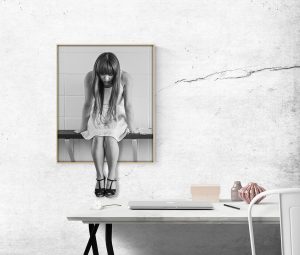Younger generations seem to have a care-free wonderful life but underneath their happy facades, many women are actually struggling with high levels of stress, mental health issues, lack of well-being and financial insecurity.
Research has shown the contradiction to the pretty faces on Instagram and the reality for most women. An internal turmoil of not ‘measuring up’ is having a detrimental impact on their quality of life.
Despite coming out on top of many socio-economic indicators such as income and education levels more young women are finding themselves struggling with higher levels of stress.
Women thrive on the relationships created with others and contribute to their well-being. If we don’t have the emotional support of other relationships our mental health does start to suffer. Social connections usually confirm our identity and values in life.
The report showed that women aged between 18 and 29 tend to have the lowest level of well-being of any group due to a perceived lack of time, financial worries and work-related issues.
Not only that, but the success and happiness that they experience in other parts of their lives tends not to offset this anxiety. Feeling overwhelmed by life choices and pressures may include substances like alcohol or recreational drugs to feel better. Young women were faring the worst. Common unhealthy coping strategies include not exercising, over-eating or skipping meals or eating junk food to soothe difficult feelings.
Women and Guilt
Guilt is a common trait amongst anxiety sufferers and women are less likely to seek help or even acknowledge they have a problem. It doesn’t help to see women’s magazines using the word guilty in relation to foods like chocolate.

On the surface, the happy façade looks like they have it all and seemingly falling short makes a woman feel guilty because they feel struggling to meet expectations when underneath they’re worried about when and how they should do things.
Part of this is caused by the increasing pressure on how life-choices are perceived by others but that it is not realistic. Our strive for perfection is not doing us any favours.
Instead of reveling in freedom and leisure we are currently experiencing an epidemic sense of time poverty. The over-busyness comes with an attendant sense of anxiety. That stress is having a much stronger physical and emotional impact on women compared with men. Many women lay awake at night due to stress or require time off work due to migraines. Lack of sleep is a large contributor to anxiety and stress.
One of the biggest obstacles to women’s happiness is being ‘stretched’ by the demands on them at home and work. Some are feeling like stressed-out failures. Younger women report a common feeling of being tired due to their load in life.
The capacity to multi-task — to be a high-performance employee, parent, daughter and spouse now has become a badge of honour. But what have women lost when it comes to the quality of life?
Younger women also tend to take fewer holidays than men due to employment insecurity and that their bosses may think they weren’t committed to their position – again, another fight for equality.
What’s the impact of all this stress?
Constant anxiety compromises the immune and cardiovascular systems making people more likely to catch colds and flu and to suffer from conditions like high blood pressure.
Chronic stress causes the body to release an excess of the hormone cortisol which can result in anxiety, depression and sleeplessness. Women often neglect their own health issues and ‘soldier on’ until everything else is done. Women are also reluctant to take sick days from work so they can keep them in reserve if they need to attend to a sick child or elderly parent.
Millennials are graduating from high school and university into a precarious job market where many cases are underemployed. This is in stark contrast to generations past where it was possible to study hard and have a secure, long-term career in a chosen field.
With the use of social media in our daily lives, the cycle of guilt and overcompensating is heightened where we are relentlessly measuring our lives and accomplishments with others.
Women have less support and less control over their daily schedules. Transport, childcare, employment and housing all add to the stress of modern life. They also feel the pressure to work harder in a job in order to be taken seriously and considered for any promotions.
They think that everyone else has got their life together and it’s just them who feel overwhelmed. Young women judge themselves as much more harshly than other people do.
Part of the stress for younger women and men appears to be caused by the digital deluge with well over a quarter of all workers feeling compelled to check work emails while on holiday or at weekends and feeling stressed out as a result.
Life seems to be more stressful now than it was a decade ago. Younger adults suffering more physical stress than ‘baby boomers’ report that they feel exhausted, complain of regular headaches and are getting more bad-tempered compared with older work colleagues. it is unsurprising perhaps that younger adult workers, worried about their bank balances and job insecurity feel they must put in the most overtime.
In a survey of 500 adults aged between 25 and 35, they regarded their biggest life achievement as owning their own home and having children. Given that is a dream that is now becoming more unaffordable many younger people are wondering what their future holds for them.
It’s no wonder there is a rise in young women suffering from stress and anxiety related to work and life.
How to deal with this stress?
Get off the phone. Turn down the alerts so you can’t hear them and set a short time to see and respond over the day. Set a scheduled bed-time and switch off a half-hour beforehand as part of sleep hygiene and routine.
Eat healthy food and at least a brisk walk three times each week as a minimum. Breathe. Stress decreases oxygen through short breathing. Spend time with friends who support you and enjoy your company as their emotional support eases stress when you have a buddy.

Philippa Hunt is a Woman on a Mission.
WiseGirls Money Academy was created after working as a qualified Financial Adviser for many years and deciding it was time to assist women who desired to learn and develop the self-empowerment to understand their emotional relationship with money, the skills and knowledge to save and invest. They wanted to learn how to create their own financial future and become financially capable.
The WiseGirls Money Mission is to provide the opportunity and place for growth and development of women of all ages in personal and financial skills in a supported female environment so that they take control of their future to reach their own financial independence.


